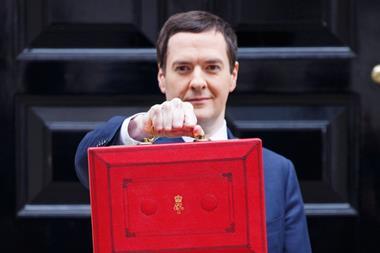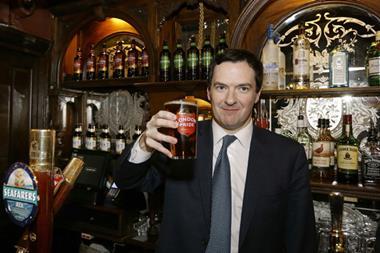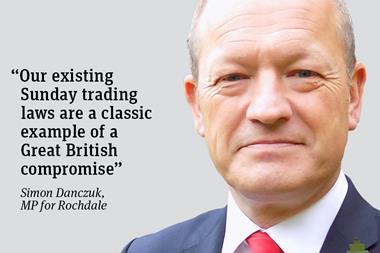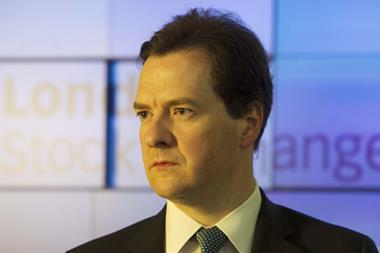
Tesco CEO Dave Lewis warned earlier this year the government was at risk of inflicting a “lethal cocktail” of wage hikes and business rates on retailers. So did George Osborne make retailers’ worst fears come true? Here’s our round-up of how the grocery industry has reacted to today’s Autumn statement.
The British Retail Consortium said Osborne’s statement would only have “a minimum positive impact” on retailers, which were facing “ever-increasing costs” in the form of business rates, the national living wage and the apprenticeship levy. “Although retailers have committed to achieving the National Living Wage and more, there is a very real danger that there will be fewer people employed in the industry as a result,” it warned.
On business rates specifically, BRC director general Helen Dickinson added: “It is encouraging that the government appears to be taking their time to consider their options for fundamental review of the business rates system. We have long said that it would be better to take the time to get the solutions right on the first go and design a system that is fit for purpose.”
But she warned: “If left untouched the burdens on business will weigh the retail industry down. We are making a huge contribution to increasing wages and providing training and jobs. If retail is to do this successfully and not lose jobs in the future the Government will have to go beyond the devolution of business rates and deliver fundamental reform of the system early next year.”
Ian Wright, director general of the Food and Drink Federation, said “growing apprenticeship numbers is a key ambition for the UK food and drink industry. Reform is needed to make this route more attractive, and an apprenticeship levy system that is proportionate, simple and works for businesses of all sizes will be a key ingredient in achieving this. The rate announced today will be a cause of concern for larger businesses, and may hit company investment pots for staff training and, perversely, new apprenticeship starts.
James Lowman, CEO of the Association of Convenience Stores, welcomed the government’s commitment to extending small business rate relief in 2016. But he added: “We are, however, disappointed that no announcement has been made on the continuation of business rates discount of £1,500 for high street retailers.”
The ACS also had “significant concern” about the devolution of rate setting powers to local authorities. “We’ll have to wait for the Budget in 2016 for more details on the government’s review of business rates,” Lowman said. “Businesses need certainty to be able to effectively plan for the future, and we urge the Chancellor to consult with businesses now as he develops these proposals.”
Ian Cass, MD of The Forum of Private Business, also highlighted small business rate relief for a further year as a welcome announcement, “although giving 100% of business rates raised locally may starve the rest of English authorities of resources as London has 30% of the country’s rateable land”.
Cass added he was “pleasantly surprised” by Osborne’s budget, with the 50% increase in infrastructure capital spend and the focus on skills especially positive. ”However the devil will be in the detail as tax avoidance schemes may lead to increased costs on small businesses and we do not yet know what the 17% of reduction in the budget department of Business Innovation and Skill will mean for Britain’s 1.3 million employers.”
David Parker, head of rating at Savills, said allowing local authorities to retain business rates was a “red herring”. “Essentially, today’s announcement might shift the burden on to richer authorities to invest in business growth for UK plc, but it risks poorer local authorities becoming poorer still. What the government needs to do is invest in UK business by reducing rates by 20% across the board.”
Phil Mullis, head of retail and wholesale and Partner at Wilkins Kennedy, said the government needed to do more to ensure business rates were fair. “It is not just the smaller retailers that are facing the burden – larger retailers are also championing change. In order to secure the future of the high street, the Government needs to be much more proactive and sensitive to the way the world is changing.”
Gail Soutar, chief economic adviser of the National Farmers Union, highlighted Osborne’s announcement that Defra’s day-to-day operating budget would be cut by 15% and said the full impact on farmers remained to be seen. “It is reassuring that the flood defence budget will be ring-fenced and that the government will prioritise spending on animal and plant disease prevention, for example by continuing to invest in implementing its 25-year strategy to eradicate bovine tuberculosis. “
Soutar also welcomed the u-trun on tax credits “as this will help many farmnig families who are experiencing falling incomes” but said it was “disappointing” the government would end micro employer relaxation of PAYE from next April. “This will impose a significant additional burden on many agricultural businesses engaging seasonal workers at harvest time. Larger employers will, however, be concerned at the rate of the new Apprenticeship Levy of 0.5% of payroll costs from April 2017.”
Nick von Westenholz, CEO of the Crop Protection Association, focused on the cuts to Defra’s budget. Cuts didn’t appear as deep as feared, he said, but “we are concerned at any cuts which diminish government’s policy capacity across agriculture, and in particular on crop protection issues.” There were a number of important industry research projects under way, and it would be counterproductive to abandon research where significant investment had already been made, he said. “Through the Agri-Tech Strategy the government has demonstrated its commitment to making the UK a world leader in agricultural technology and innovation; we want to see that work continue.”
The FairFuelUK campaign group criticised Osborne for “not even mentioning fuel duty”. It was great that fuel duty had been frozen five years in a row, the group said, “but let’s not forget the UK motorist remains the highest levied tax contributor in Europe. He could have been more courageous for the economy’s sake and cut it by 3p. Be warned, this is probably now a fiscal platform for him to increase duty in the April Budget.”
Apprenticeship Levy basically a new payroll tax of 0.5% - Germany style dirigisme - huge deal. Businesses wont be happy.
— Faisal Islam (@faisalislam) November 25, 2015
*falls off chair* Osborne listened to me! And lots of others. £15m from tampon tax to be spent on women’s charities. #spendingreview
— fleetstreetfox (@fleetstreetfox) November 25, 2015



















No comments yet